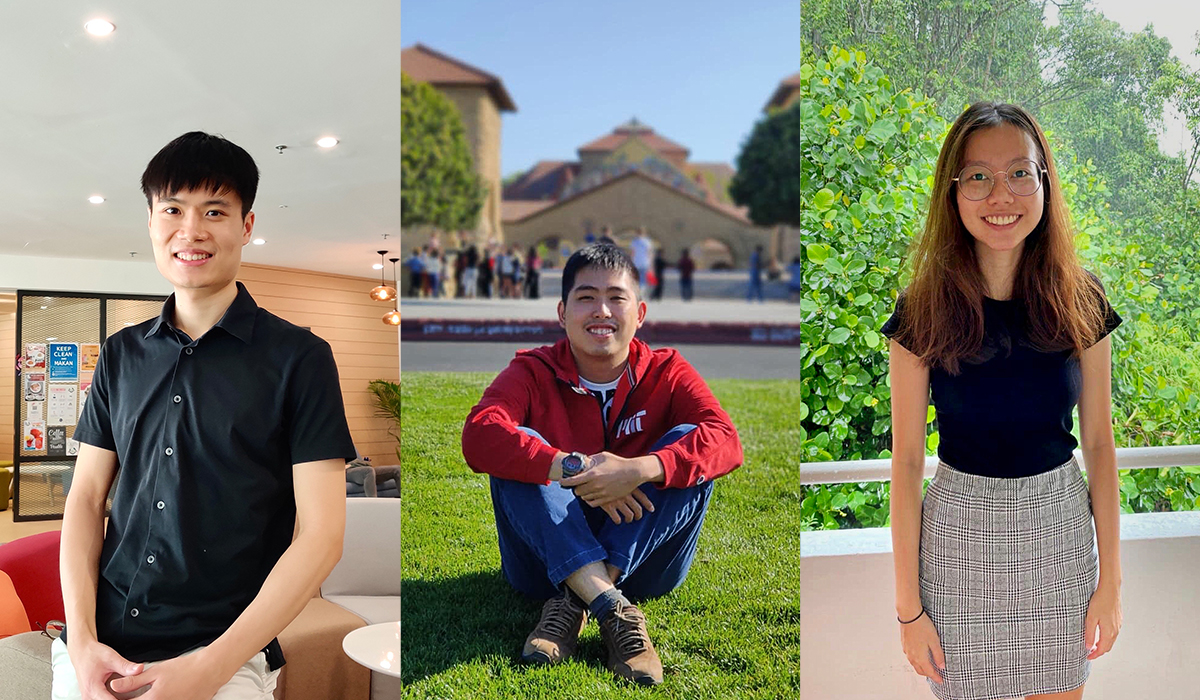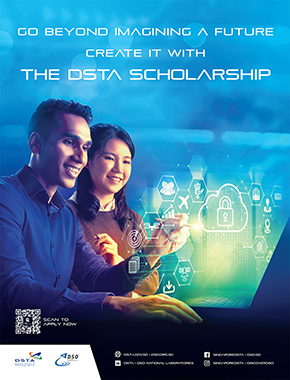Left: DSTA scholar Isaac Yeo En Jie is a Senior Engineer in Cybersecurity Programme Centre at the Defence Science and Technology Agency, where he develops in-house cyber software tools and features to protect Singapore’s defence systems. He has a Bachelor of Science in Computer Science and Engineering from the University of California, Los Angeles.
Middle: DSTA scholar Angus Foo Dun Shiong is a Defence Research Engineer at DSO National Laboratories, specialising in Time Series Analytics and Image Analysis. He has a Master of Science in Computation for Design and Optimisation from the Massachusetts Institute of Technology, and a Bachelor of Engineering (Engineering Science) from the National University of Singapore (NUS).
Right: DSTA scholar Wong Wen Wei Esmanda is currently pursuing a degree in Computer Science at NUS.
Leading the technological frontlines of national defence is no easy feat.
Engineers, developers and researchers at the Defence Science and Technology Agency (DSTA) and DSO National Laboratories (DSO) tackle challenging programmes that provide cutting-edge solutions for the next-generation Singapore Armed Forces (SAF).
DSTA is continually developing, enhancing and reimagining the future of defence. By harnessing multidisciplinary expertise, DSTA applies the latest technologies in various fields such as cybersecurity and data analytics to equip our soldiers with advanced systems.
Equally important is the work of DSO, which is entrusted with the critical mission of developing technological surprises to enhance Singapore’s defence and national security capabilities. DSO looks into 50 research areas across the domains of air, land, sea, space and cyberspace.
Our very own digital defenders sat down with us to talk technology, passion, and what awaits the next generation of DSTA scholars.
We chatted with Isaac Yeo, Senior Engineer from DSTA’s Cybersecurity Programme Centre, who develops in-house cyber software tools and features; Angus Foo, DSO’s Defence Research Engineer specialising in Time Series Analytics and Image Analysis; and Esmanda Wong, who is currently pursuing a degree in Computer Science at NUS.
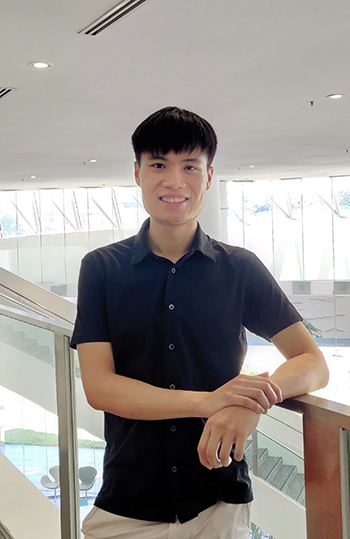
Isaac Yeo En Jie
Firstly, why the DSTA Scholarship?
Isaac: After my A-levels, I knew I wanted to delve into engineering as I enjoy Math and Physics. I shortlisted employers that would allow me to pursue my interest in a dynamic engineering organisation, and found a great opportunity in the DSTA Scholarship.
The DSTA Scholarship offered a wide range of career pathways while allowing me to embark on my chosen course of study. The defence sector is full of opportunities to develop digital and engineering skills, as it is where many cutting-edge innovations first emerge. It would also allow me to apply directly what I learn from university in a meaningful way, while playing a part in contributing to Singapore’s defence.
Angus: I was pretty clear on the fact that I wanted a career in research. However, I was unsure if academia was the path I wanted, especially with the relentless push for publication.
Working in the defence sector meant that there wouldn’t be a push for publication, which affords me more time and effort to focus purely on my research. Additionally, there was always the flexibility of pursuing a PhD in the future with the DSO Postgraduate Scholarship if I so desired.
Esmanda: At the DSTA Scholarship Tea Session, I gained first-hand insights into the scholarship and the diverse scope and opportunities in the Defence Technology Community (DTC). I was very impressed with the cutting-edge technology used to engineer solutions for national defence and security. A career in DSTA would allow me the invaluable opportunity to push the boundaries of science and innovation constantly while serving the wider community.
Isaac and Angus, what were your biggest takeaways from university, and how do they apply to your work?
Isaac: As part of my major, I studied a wide range of topics in computer science. Some of the concepts I learnt were extremely useful and relevant, and I was able to apply them in my work as a cyber engineer. I also had plenty of opportunities to work on programming projects in school. The problem-solving skills gained helped prepare me to solve multi-faceted technical problems at work.
Angus: Interestingly, just a few months back, I wrote to my thesis advisor that although my current field of work is vastly different from my thesis, I was actually able to apply the same techniques I developed during my Masters to one of my projects in image processing. Beyond the specifics, the research techniques I’ve learnt are still extremely relevant as I continue to work with state-of-the-art research papers and formulate novel problem statements to solve in the course of my research work.
As for Esmanda, we understand you are still studying. Can you tell us about some non-academic activities you have participated in, and how you expect them to contribute to your work in future?
Esmanda: I have participated in various hackathons to enrich my learning as well as gain experience through solving real-world problems. In a hackathon organised by NUS Developer Student Club, my friends and I learnt how to use the OpenCV library to perform object detection and counting. The hackathon exposed me to the field of computer vision, which could aid the development of autonomous vehicles using AI.
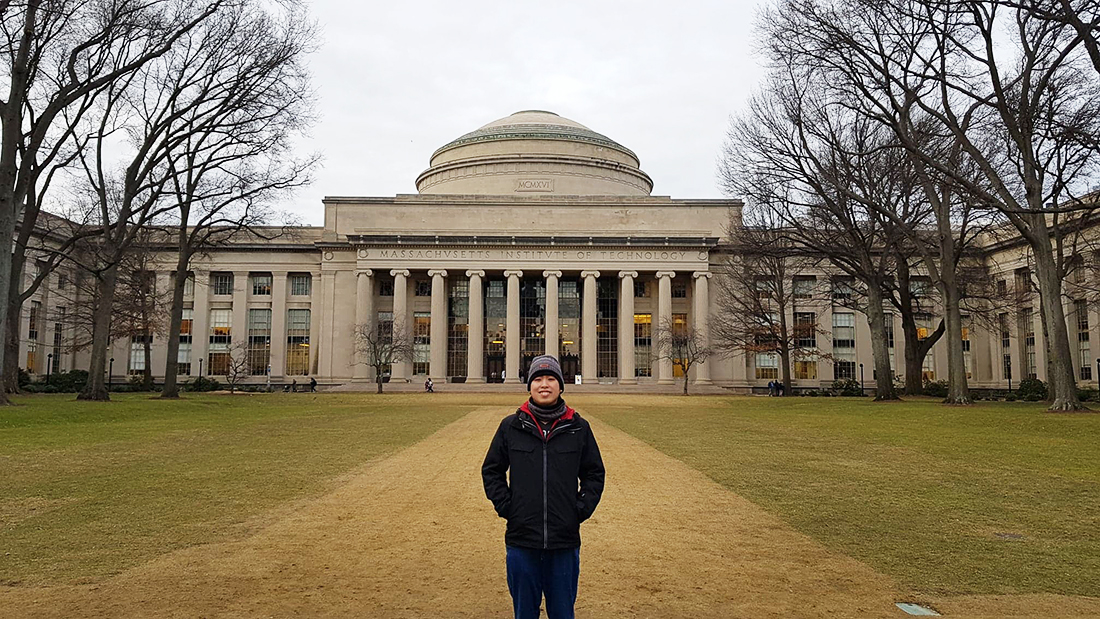
Angus Foo Dun Shiong
And those are just some examples of the support you received under the DSTA Scholarship! Isaac, Angus, how about your experiences at DSTA and DSO?
Isaac: During my studies, DSTA assigned a senior student to mentor and support me under a buddy system. DSTA also arranged engagement sessions and tours at DTC to give us a better idea of where we wanted to work. For my internship, I was attached to DSTA’s Cybersecurity Programme Centre, where I had the chance to develop web tools to find out what kind of data could be leaked when browsing the internet.
Upon joining DSTA after my graduation, I was given many opportunities to attend courses and talks to keep myself up to date with the latest technologies. At DSTA, we place a very strong focus on continuous learning, and beyond courses, we also learn by coming together to discuss and share ideas. DSTA also regularly checks in on our career aspirations to see how we can align our goals, which is a plus!
It’s not all work either — we get to know our colleagues better through recreational activities such as treasure hunts and virtual escape rooms.
Angus: I’ve been pleasantly surprised at how open DSO is to really raw research areas. Naturally, the eventual goal still remains that a viable product should be produced within a reasonable time frame. I really appreciate that DSO is open to risk-taking and I am able to pave my own research path, which is aligned to DSO’s goals.
As both of you have started work, could you tell us more what you do?
Isaac: As a Senior Engineer in DSTA’s Cybersecurity Programme Centre, I develop software that keeps our defence systems safe and secure. My day-to-day work involves developing new features for our in-house software, and exploring new technologies to boost the efficiency and reliability of our cyber defence. As cybersecurity threats are constantly evolving, there is a wide range of opportunities to make a difference in areas such as vulnerability assessment, AI, machine learning, forensics, cryptography, and many more. I get to take my passion for cybersecurity further as well! This year, I created an app for BrainHack, a learning fest organised by DSTA, which showed students how our typing rhythms can be authenticated using machine learning!
Angus: We have a large amount of data which would require the insights of highly experienced engineers to quickly identify significant trends or issues. Processing of large volumes of data by manual techniques is laborious. Thus, I conduct data analytics to automate such processes and identify potentially significant areas that might have been missed simply due to there being too much data to analyse manually.
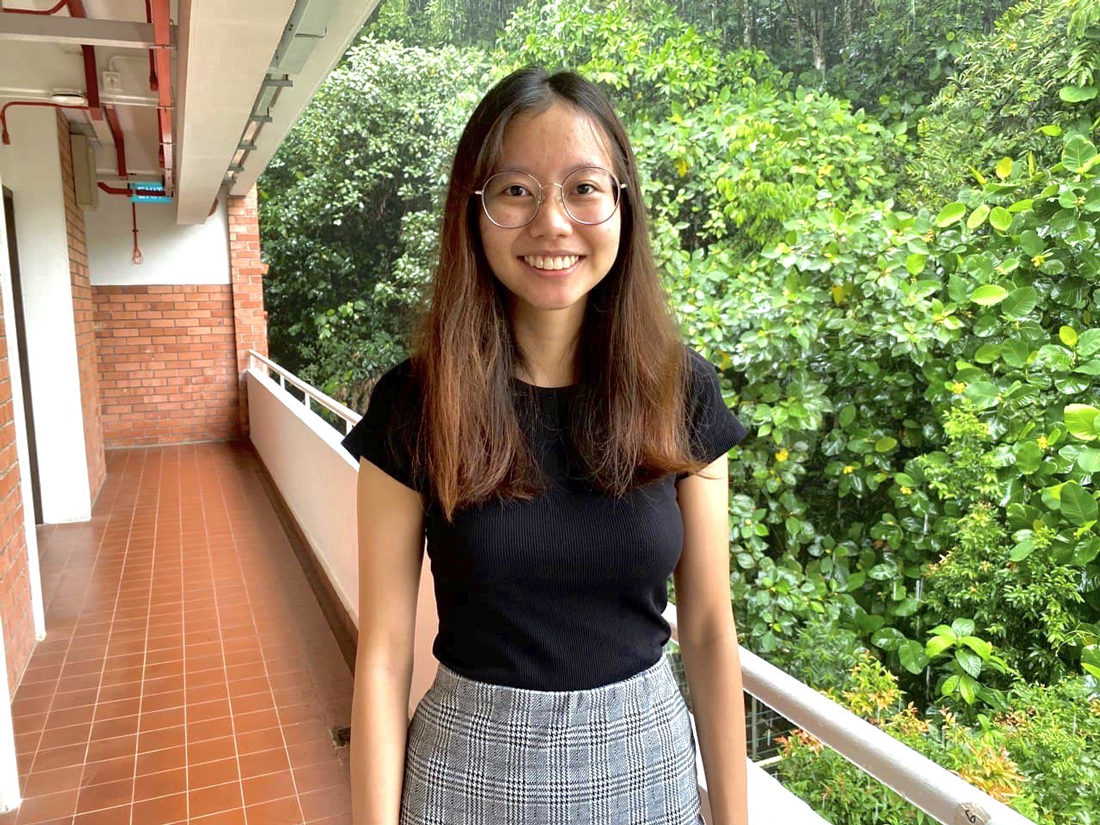
Wong Wen Wei Esmanda
And for Esmanda, what are you looking to achieve when you start work?
Esmanda: I look forward to leveraging technology to tackle pressing issues in defence! Being able to see my solutions come to life and used by people on the ground would be very rewarding. As someone who loves to innovate and create, I believe that working in the dynamic environment that DSTA provides will be highly enriching and stimulating.
That’s a big dream! And you would all say that this was made possible with the DSTA Scholarship?
Isaac: Definitely! The defence sector is an area where technology is always advancing, and the environment drives us to innovate and explore new technologies and ideas. Apart from applying the latest technologies to deliver state-of-the-art capabilities, we get to solve unique problems that cannot be found elsewhere.
The diverse challenges we face mean that multiple career opportunities and roles are available, from software engineers to AI and data scientists. Our multidisciplinary work also broadens our expertise in many domains.
Esmanda: We have many opportunities to delve into multidisciplinary work, which exposes us to a wide range of technological expertise. We are also driven to think out of the box, as being in the defence technology sector brings challenges that often require the most innovative solutions.
Angus: The possibilities are endless as there are many interesting and distinct fields of research - from natural language processing to biomedical research.
Don’t be afraid to propose new ideas as long as they pave a pathway to the common goal of the organisation!

